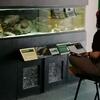In the latest guest blog from our members, The Deep shares the important role they play as IUCN ‘Red Listers’ to assess the extinction threat of marine species.
Due to its vast size, the marine realm has long been considered to be less impacted by the human species. This is fake news! Global climate change, pollution, habitat loss and overfishing are just a few of the major impacts we have on our oceans. As our population continues to grow, our impacts will inevitably follow. The threats facing the marine environment don’t just effect it and its inhabitants, but also the many benefits we derive from it. The marine realm covers more than 70% of Earth’s surface area and more than 99% of its liveable space. It drives global weather patterns. Over half of the air we breathe is produced in the oceans (and we need that). Around 80 million tonnes of fish are caught annually and more than 10% of the world's population depends on fisheries for their livelihood. Eight out of the ten most populous cities on earth are coastal and over half of the world's population lives within 200 km of the coastline. Our lives depend on healthy oceans.
So how do we tackle this problem? We begin by working together! Two years ago The Deep aquarium in Hull, England began hosting a partnership role with the world’s largest conservation network, the International Union for Conservation of Nature, or IUCN. The IUCN is often known for its Red List, a powerful tool for conservation. The Red List is a central information source that identifies the species in greatest need of help and informs the conservation actions required to save them. The trouble is there are quite a lot of species on this earth (about 8.7 million known, give or take a million) and extinctions are outpacing us. And of course, many species at risk live in the blue part of our planet. If we are to solve the extinction crisis we must work together.
Two years ago The Deep employed a Marine Red List Officer whose job it was to be trained by and work alongside IUCN staff to get marine species on the Red List. Since that time, this Red List Officer has contributed to assessing the extinction threat faced by more than 1000 marine species. Those assessments that have identified species as threatened can now inform planning and effective conservation action, moving forward. Informing global conventions, identifying key biodiversity areas, influencing the placement of marine protected areas or legislative protective measures. All of these things can be advised by a Red List assessment. The Deep’s commitment to this initiative is impacting the pace at which marine species are being assessed and making the difference for those species most in need. Looking ahead, Zoo and Aquarium institutions across the globe are forging similar partnerships to bolster Red Listing efforts and The Deep will help to support this process, guiding an international team of Red List Officers, each doing their bit for species conservation.
The impacts our species have on this planet are not going away. If we are to secure a stable future for all, then collaboration in conservation must become the norm. And that’s real news.
Related Members
-
News‘Extinct’ dove takes flight at Paignton Zoo 25th April, 2024The Socorro dove is extinct in the wild. However, Paignton Zoo in Devon is not only home to these rare birds, but keepers are proud to announce that a…
-
NewsZSL leads Earth Day lessons for schoolchildren at 10 Downing Street 24th April, 2024Today, to mark Earth Day 2024, pupils from Greater Manchester, South Wales and London schools had the unique experience of stepping inside 10 Downing…
-
News
 Blog: Working for animal welfare really is worth the effort 24th April, 2024Evidence-based animal welfare needn’t be overwhelming writes Katie McDonald, Deana Stephens, and Paul Rose, members of BIAZA’s Animal Welfare…
Blog: Working for animal welfare really is worth the effort 24th April, 2024Evidence-based animal welfare needn’t be overwhelming writes Katie McDonald, Deana Stephens, and Paul Rose, members of BIAZA’s Animal Welfare…



